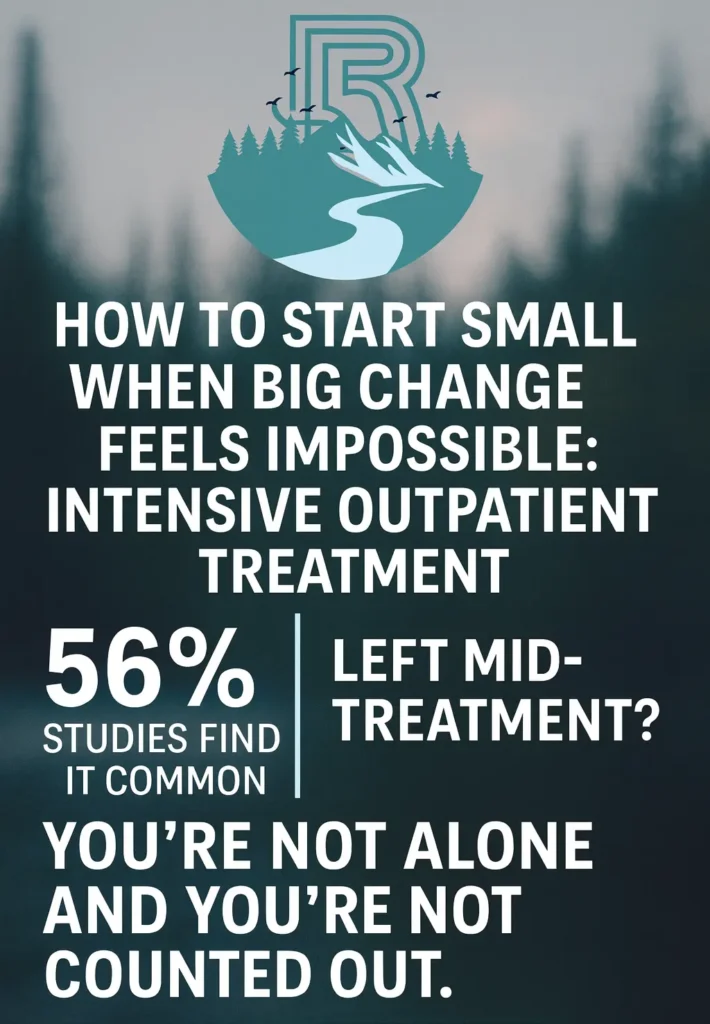When You’ve Walked Away From Help—and Don’t Know How to Walk Back
Maybe you had a good streak going. You were showing up to sessions, starting to trust the process. Then something shifted—maybe it was a tough day, a missed group, a spiral that came out of nowhere. You stopped going. You told yourself it was temporary, but the days kept passing. Now, it’s been weeks. Or months.
Now what?
If you’ve ghosted your intensive outpatient treatment—or dropped out entirely—and you’re sitting in that strange, heavy space of guilt and “should’ve,” this blog is for you. You are not alone. And you are absolutely not disqualified from trying again.
At River Rocks Recovery in Middletown, Ohio, we see this more often than you’d think. Life happens. Fear happens. Shame creeps in. But treatment isn’t a one-shot deal—and coming back isn’t failure. It’s courage.
Here’s how to start small when coming back feels too big.
1. You Don’t Have to “Start Over”—You Just Have to Start Again
Let’s kill the myth that you’ve erased all your progress.
Just because you took a break doesn’t mean the work you did before doesn’t count. The insights, the relationships, the courage it took to show up in the first place—that all still lives in you.
You’re not broken. You paused. That’s human.
At River Rocks, our team doesn’t focus on how long you’ve been gone. We focus on how we can support you from this moment forward. Whether you were in treatment for three weeks or three months before you left, we’ll meet you right where you are.
2. Say One True Thing (Even If It’s Small)
Big change starts with small honesty. And the first step back doesn’t have to be dramatic—it just has to be real.
Try this: say one sentence to yourself or to someone you trust. Something like:
- “I don’t want to feel like this anymore.”
- “I miss having people who got it.”
- “I think I need help again.”
That’s enough to crack the door open. Honesty is the opposite of shame. The minute you name what’s true, it gets a little lighter to carry.
3. Call Without a Script
One of the scariest things can be picking up the phone without knowing what to say.
You don’t need a perfect plan. You don’t need an explanation. You don’t need to justify anything.
You can just say: “Hey… I was in your IOP a while ago. I want to come back, but I don’t know how.”
We’ll handle the rest.
If you’re looking for intensive outpatient treatment in West Chester, Ohio or Monroe, Ohio, we serve those areas too—and we know the courage it takes to even consider calling. You won’t get judgment. You’ll get next steps.
4. Re-Engage in a Way That Feels Doable
When you’re feeling overwhelmed, structure can help—but only if it’s flexible. You don’t have to rejoin full-time or dive into the deep end. Here are some low-pressure ways to test the waters:
- Join one group session this week—just to listen.
- Ask if you can sit in on a virtual session anonymously.
- Reconnect with your former case manager and talk through what happened.
- Schedule one therapy session to talk through what’s been hard about coming back.
Each of these counts. Small steps are real steps. You get to set the pace.

5. Let Guilt Ride Shotgun—But Don’t Let It Drive
Shame loves to whisper that you’ve blown it. That “real” recovery wouldn’t look like this. That you should be better by now.
Here’s the truth: most people in recovery have paused or relapsed or ghosted treatment at some point. You’re not an outlier. You’re part of the story.
Let yourself feel what you feel—but don’t let guilt make decisions for you. There’s room for you here, even with the mess.
“When I came back after ghosting for three weeks, I expected everyone to be mad. Instead, they said, ‘We’re glad you’re here.’ That was it. No lecture. Just welcome.”
– Outpatient Client, 2023
6. You’re Not the Only One Who’s Ever Left Mid-Treatment
It’s more common than you think.
People pause because they’re overwhelmed, scared, ashamed, tired, or triggered. Sometimes it’s logistics—work, transportation, child care. Sometimes it’s emotional—feeling too exposed, too alone, or too unsure.
At River Rocks, we build our intensive outpatient treatment to flex with your reality. That means:
- Evening and virtual options when available
- Step-down and step-up options if your needs shift
- A team that remembers you’re human—not a case file
We’ve walked people back in after days, weeks, and even years. And every time, it starts the same way: a decision to show up once.
7. If You’re Not Ready Yet… Stay in Touch Anyway
Coming back doesn’t have to happen today. But you can still stay connected while you figure it out.
Here’s how:
- Visit our IOP program page and reread what’s offered.
- Follow us on social media for recovery reminders.
- Text a friend from your old group and say, “Hey. Miss you.”
- Save our number in your phone: (888) 905-6281—so it’s there when the moment comes.
Even tiny acts of connection help pull you out of isolation. They’re like emotional breadcrumbs leading you back when you’re ready.
Frequently Asked Questions About Returning to IOP
Can I come back if I left without telling anyone?
Yes. We understand that sometimes people leave suddenly. You don’t have to explain everything. Just reach out when you’re ready, and we’ll talk through next steps.
Will I be judged for leaving or using again?
No. Our approach is non-punitive and deeply compassionate. We know shame keeps people away, and we work hard to create a space where you feel safe returning.
Do I have to start over completely?
Not necessarily. We’ll meet with you to assess where you’re at and decide together what makes the most sense. In many cases, you can pick up close to where you left off.
What if I’m not sure I want to fully rejoin yet?
That’s okay. You can ask about partial participation, virtual options, or simply have a conversation to explore your feelings. There’s no pressure.
Do you offer services in my area?
Yes. If you’re looking for intensive outpatient treatment in Dayton, Ohio, Monroe, Ohio, or West Chester, Ohio, River Rocks serves those areas. Check our full service area list here.
The Door’s Still Open. You’re Still Welcome.
Recovery isn’t linear. Dropping out doesn’t mean giving up. You’re allowed to come back—and we’ll be here when you do.
Call (888) 905-6281 or visit to learn more about our Intensive Outpatient Treatment services in Middletown, Ohio.




























